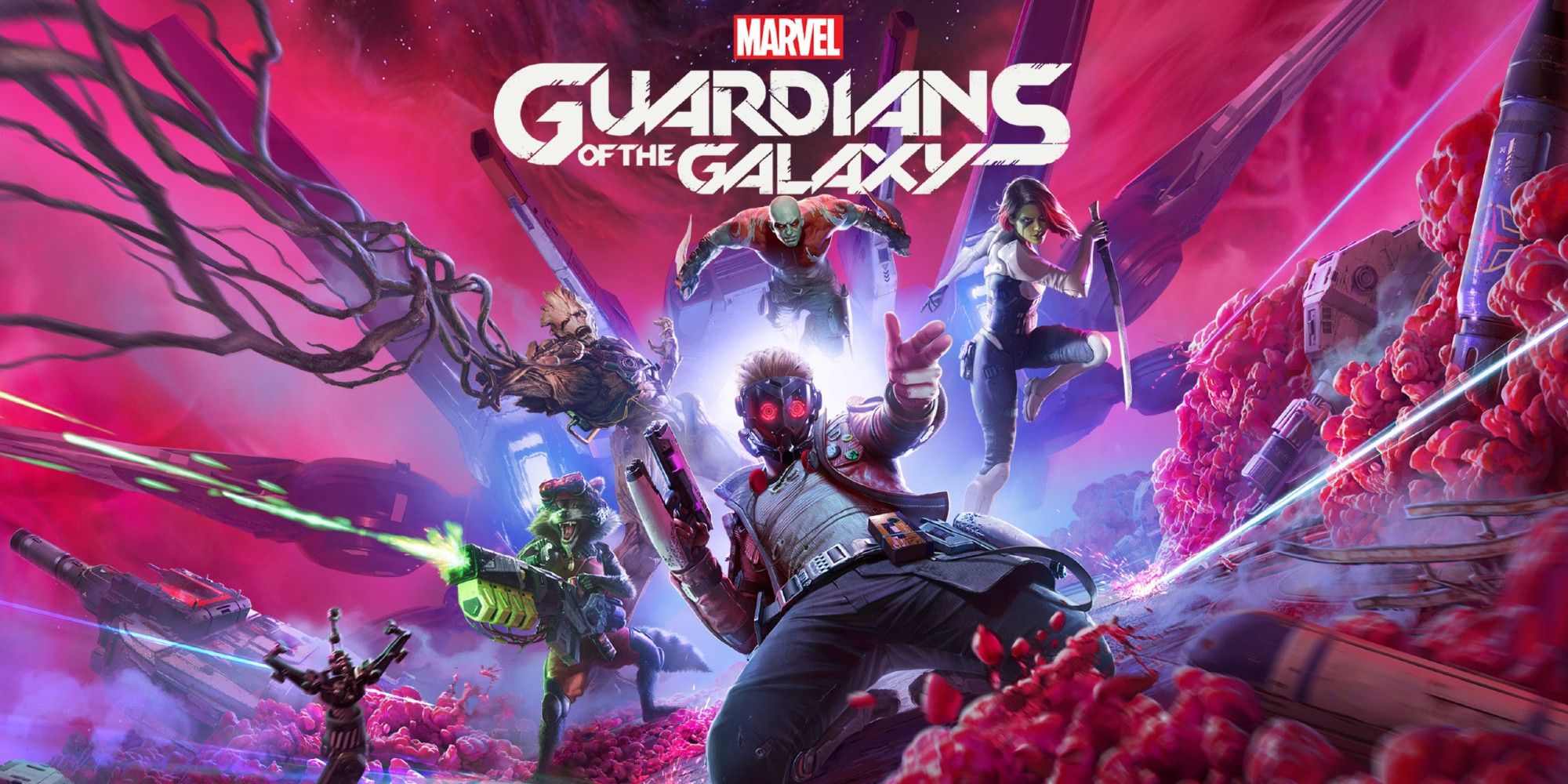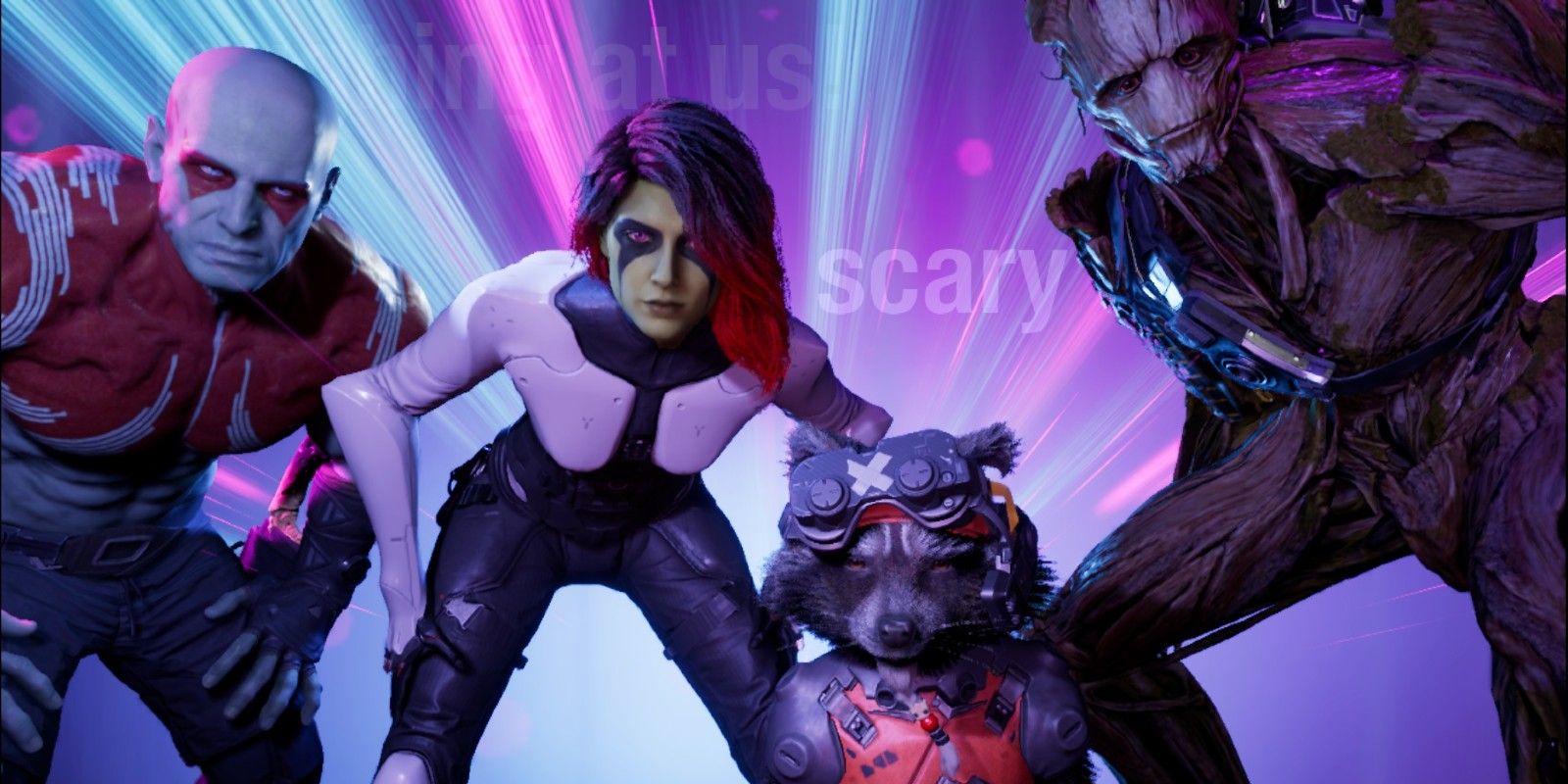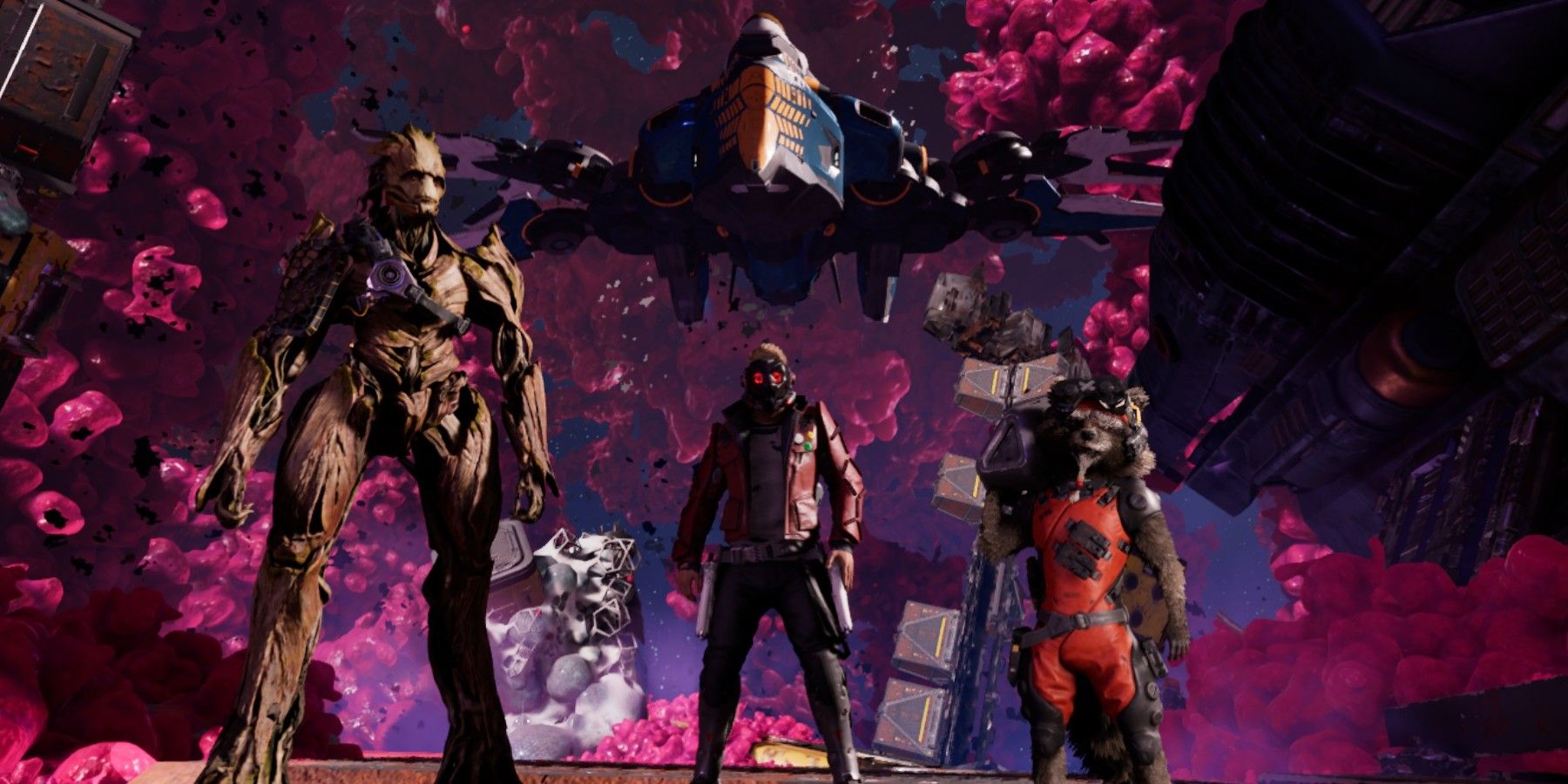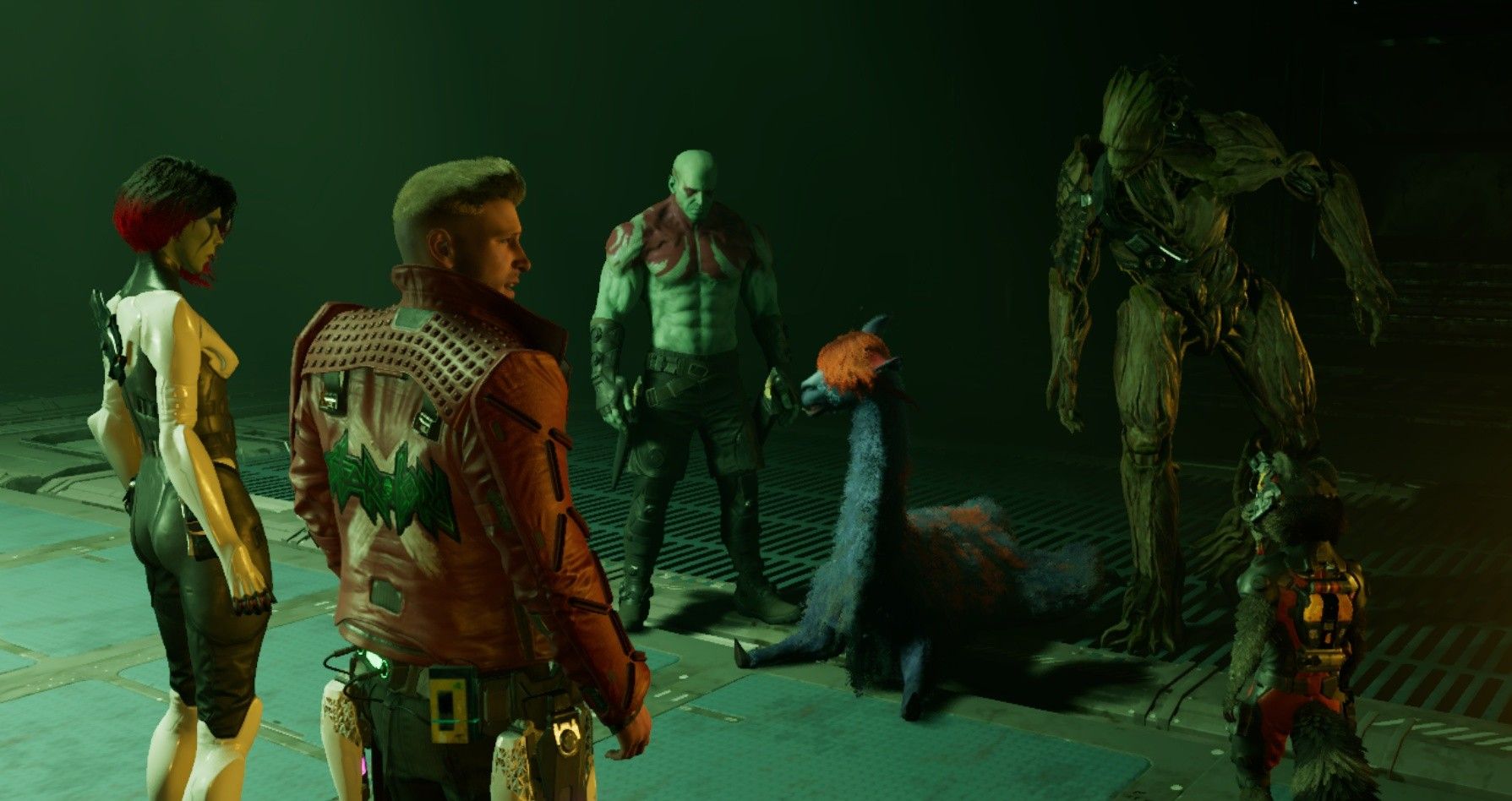Leading a ragtag team of superheroes-for-hire is no small feat, but in Marvel's Guardians of the Galaxy, that team leadership will determine the fate of the galaxy. Marvel's Guardians of the Galaxy puts players in control as Star-Lord, the legendary outlaw. He will be joined by Rocket Raccoon, Groot, Gamora, and Drax the Destroyer on a chaotic mission to rectify mistakes and address the consequences of their actions and choices. Developed by Eidos-Montréal, Marvel's Guardians of the Galaxy is a fantastic, often bombastic adventure with erratic combat and meaningful choices. The game also features an impressive soundtrack with over 30 popular hits from the biggest names of the 1980s, including BLONDIE, Def Leppard, and Tears for Fears.
The story begins with the Guardians of the Galaxy, who have already been working together for some time, in the middle of a quest to subdue and capture a monster to bring to the legendary Lady Hellbender to earn some money. In doing so, they make a mistake that draws the ire of the Nova Corps and sends the team on an adventure to rectify their mistakes before they destroy the peace of the galaxy. Player choices help shape the narrative, and Star-Lord's decisions at every turn can have far-reaching or benign consequences. The game is fast-paced, with exciting combat and interesting puzzles, but it suffers somewhat from clunkier combat mechanics, repetitive locations, and often unclear prompting.
Combat in Marvel's Guardians of the Galaxy is a huge part of the game, and players will have a variety of weapons and powers at their disposal. Star-Lord can make use of jet boots, elemental blasters, and a variety of DPS and crowd-control abilities from the other Guardians to fight through mobs of alien creatures that can sometimes feel endless. Between these smaller fights, players will also encounter difficult, if not repetitive, boss battles that last a while and often force a run-and-gun strategy. Unlike most third-person shooters, players will need to blind fire or lock onto each target, and Star-Lord must be targeting an enemy to issue orders to his team, which can limit positioning significantly and make the action feel a bit clunkier.
Marvel's Guardians of the Galaxy excels when it comes to storytelling, particularly characterization, dialogue, and the integration of player choices. While the story is more of a collection of events than a tight narrative held by a singular tension, it feels appropriate for these characters to spend much of their time stumbling around, cleaning up the aftermath of their chaos and inevitably creating more in its wake. The story is compelling enough to keep players engaged, and the unpredictability of Marvel's Guardians of the Galaxy's story ensures plenty of unexpected encounters.
The core team in Marvel's Guardians of the Galaxy is characterized pitch-perfectly. This particular narrative adheres more strongly to the comics than Marvel's 2014 Guardians of the Galaxy film; in the game's timeline, for example, Drax succeeded in his bid to kill Thanos the Mad Titan, and Rocket mentions what happened to his soulmate, Lylla. The characters shine most when the team banters, usually between or during missions. Members of the team argue, give their own ideas and opinions, tease one another, and reminisce, and most of these lines are unique and unrepeated. They also berate Star-Lord if he takes too long to complete a task or double-check an area they specifically told him was a dead end, helping breathe life into their organic-feeling friendships.
Similar to some of the best Telltale games, players will need to make choices both in cutscenes and during exploration in Marvel's Guardians of the Galaxy. When moving through different chapters, Star-Lord will often need to break up arguments or rally his team. In cutscenes, he will need to decide how to respond to a situation the Guardians find themselves in. Often, members of the team will react to Star-Lord's decisions and remember his choices. In cutscene situations, the choice Star-Lord makes can change the trajectory of the story or earn the team useful allies. If Star-Lord takes too long to respond to a situation and stays silent, the consequences can change significantly, which could either work for or against the team. It is not clear to what extent Marvel's Guardians of the Galaxy is a game where choices really matter; players would need to complete the story or each chapter again and make a different choice to see the full scope of consequences they might face. As the game auto-saves fairly frequently, it is next to impossible to restart a scene and make a different choice in the same run.
While players can unfortunately only control Star-Lord in Marvel's Guardians of the Galaxy, the rest of the team is integrated fairly uniquely. At interactive elements in the environment, Star-Lord can issue orders to his team. Usually, he can ask Rocket to climb in small spaces or hack systems, Gamora to slice through obstacles or jump and climb to high places, Groot to form bridges across difficult ravines, and Drax to lift, pull, or move heavy objects. While the correct choice is usually obvious, this mechanic gives the team more to do than to just follow the player and makes them each feel important to the story.
Where Marvel's Guardians of the Galaxy struggles most is in its combat design. Without the ability to control other members of the team, players as Star-Lord are limited to issuing orders. However, with combat as intense and fast-paced as it is, and with Star-Lord often drawing the aggression of multiple creatures at a time, it can be extremely difficult to strategize and create combos that use multiple Guardians' skills. The combat arenas always look about the same, usually consisting of a circle or half-circle with limited options for running and cover. The lack of variety in these designs, coupled with repeated bizarre alien creature enemy types, can make combat feel repetitive and somewhat less rewarding.
Another more frustrating aspect of Marvel's Guardians of the Galaxy is the quick action mechanic, and the button prompts that accompany quick actions. Some quick actions will be inconsequential, like pressing a button rapidly to blow out all of teenage Peter Quill's birthday candles. Most of these quick actions are integral to the plot, however, and result in an untimely death if they are not executed correctly. It is not always clear what players are expected to do to succeed in each quick action; sometimes, they must press and hold a button, but only when a meter hits a specified zone. Other times, they will need to use new buttons or keys to control and target a gun that, outside the cutscene, requires no such calibrations. These become confusing, and often frustrating after multiple deaths.
The repetitive combat and the confusing quick actions would be less problematic if players could count on instantly loading back into their most recent checkpoint. However, at least on PC, this is not the case; loading screens can take significantly longer than expected, and multiple deaths can result in an extended amount of downtime for each try as players attempt to work out how the quick action works or survive a fast-paced fight with multiple, powerful enemies.
Exploration also feels somewhat empty in Marvel's Guardians of the Galaxy, as most of the paths are extremely linear. The environments are designed to keep the party contained to a particular area, though there can sometimes be alternate paths to the same location. Many of these paths lead to dead ends, and Star-Lord will often need to use his visor to scan for interactive objects. To move forward, he will need to solve puzzles that often involve clearing debris, shooting at items, or using the order function to get help from his companions, but there is never a real chance of straying away from the objective. This could be a good thing, especially for players who feel open-world games have gotten too big and too common, but it can also lead to the feeling railroaded through the story.
Despite some of its more glaring drawbacks, Marvel's Guardians of the Galaxy is a charming experience that feels like it comes straight from the pages of a comic book. The characters and chaotic story are the heart of the game, and these elements are executed exceptionally well. Despite its clunkiness, the combat can be fun and heart-pounding, and the way the choice mechanics are integrated makes it feel as though players really do cause the unpredictable consequences the Guardians face. For superhero games in particular, Marvel's Guardians of the Galaxy is a breath of fresh air that demonstrates just how much fun, and how innovative, single-player games can still be.
Marvel's Guardians of the Galaxy is available for PlayStation 4, PlayStation 5, Xbox One, Xbox Series X/S, Nintendo Switch, and PC. A Steam code was provided to Screen Rant for the purpose of this review.




